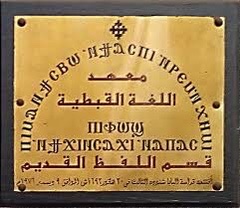From the Arabic book, written by Fr. Shenouda, (The old Bohairic Coptic accent , its history, Authenticity and preference)- Translated By Dr. Mariam Michael :
Third question:
Is it possible to accept the modern pronunciation as an accent – even if it is invented – and to continue teaching and publishing it by the virtue that it is a fait accompli?!
The answer :
Getting back to the righteousness is a virtue, as against it is a vice. It is most worthy to follow the right. To surrender to fault, to proceed in it and to legalize it, is not an accepted issue by the scientific conscience, nor is it consistent with our principles of Christianity.
As to forfeit the old pronunciation is a crime against our Coptic heritage; if we commit it, we will be blamed by the future generations.
If teaching the modern pronunciation has succeeded and the use of the Coptic language has spread among the Copts in their daily life, I could have got a meaning to the objection that claims recognizing the de facto. Teaching the modern accent has failed to revive the Coptic language as the language of conversation, and its use has been limited to the church’s prayers only; this is due to the reluctance of people to learn about the Coptic language with the modern pronunciation, and their failure to understand it. Accordingly, most of the prayers of the mass were translated into the Arabic language. In addition, the parts that are prayed in Coptic in most of the churches do not exceed the fourth of the Divine Liturgy. This means that people do not hear the Coptic language in the churches except for, approximately, half an hour of composed Coptic tunes. So, if we calculate this part, that they hear in the mass in Coptic, without composing, we will find that it takes in its recitation only about ten minutes.
The author :
Fr. Shenouda Maher Ishak ( previously Deacon Dr. Emil Maher Eshak ).
Translated by Dr. Mariam Michael
